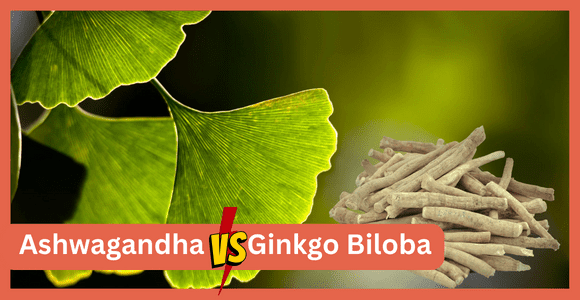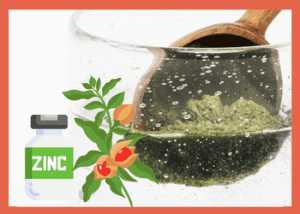Ashwagandha and Ginkgo Biloba have been a mainstay in traditional medicine for centuries. Presently, their potential health benefits are more widely researched than ever before – from improved cognitive abilities to reduce stress and anxiety levels, and even enhanced immune system performance.
People everywhere are turning towards these herbal supplements as an all-natural solution to improve overall well-being.
Ashwagandha and Ginkgo Biloba have specific characteristics and ways in which they work, meaning one may be preferable for a certain person or health issue over the other.
In this post, we’ll uncover their similarities and differences, as well as look into their potential advantages and risks to provide you with the knowledge you need to decide which is best for your unique situation.
Table of Contents
What are Ginkgo Biloba and Ashwagandha?
Ginkgo Biloba Ginkgo Biloba is derived from the leaves of the ginkgo tree and has been used in traditional Chinese medicine for centuries.
The Ingredients of Ginkgo Biloba Extract
 In the production of pharmaceuticals, Ginkgo Biloba leaves and seeds are employed as basic materials to create extracts.
In the production of pharmaceuticals, Ginkgo Biloba leaves and seeds are employed as basic materials to create extracts.
They contain more than 100 bioactive components:
- Bioflavonoids. Flavonoids comprise one-fourth of all the active ingredients found in plants, and they are mainly represented by quercetin, kaempferol, and isorhamnetin. Additionally, glycosides such as ginkgetin and triterpene compounds also belong to this group. Proven to be incredibly effective, Ginkgolide and Bilobalide are two active components that dominate the volume of ginkgo extract. These lactones occupy a staggering range between 6-12%!
- Microelements and minerals. This plant extract is brimming with essential minerals and elements, including magnesium, iron, potassium, calcium selenium, phosphorus, manganese, and copper.
- Antioxidants and anti-inflammatory compounds. Powerful tannins and superoxide dismutase serve as a natural protection for our bodies against the detrimental effects of free radicals. Plus, additional beneficial compounds such as essential amino acids, organic acids, waxes, kahetins, and polyprenols make up this compound-rich formula.
It’s known for its potential benefits in improving cognitive function and memory, reducing anxiety and depression, and increasing circulation. Here’s a table of the potential benefits and side effects:
| Potential Benefits | Potential Side Effects |
|---|---|
| Improved cognitive function and memory | Headaches |
| Reduced anxiety and depression | Dizziness |
| Increased circulation | Upset stomach |
Ashwagandha is an adaptogenic herb that has been used in Ayurvedic medicine for thousands of years. It’s known for its potential benefits in reducing stress and anxiety, improving mood, and enhancing immune function.
 The Ingredient List of Ashwagandha
The Ingredient List of Ashwagandha
L. Chen’s research suggests that withanolide structures, which comprise steroid lactones and their glycosides, are the main active ingredients in this instance.
Ashwagandha extract composition:
- Steroid lactones vitanon, withaferin A, withanolides, and withanolides, as well as their glycosides;
- Ashwagandha Nolide, figuline, viscose B lactone, other sulfated steroid-type lactones;
- Kaempferol, naringenin, catechins, β-sitosterol and stigmasterol, trigonelline and phenolic acids;
- Allic, palmitic, oleic, linoleic, and linolenic acids, a derivatives of 1,4-dioxane.
- Ashwagandha contains polysaccharides consisting of arabinose, galactose, glucose, rhamnose, and fucose.
All nightshade plants contain withanolides, but ashwagandha is particularly rich in these compounds.
Here’s a table of the potential benefits and side effects:
| Potential Benefits | Potential Side Effects |
|---|---|
| Reduced stress and anxiety | Upset stomach |
| Improved mood | Diarrhea |
| Enhanced immune function | Vomiting |
It’s important to be aware that while Ginkgo Biloba and Ashwagandha can have potential benefits, they may not be suitable for everyone.
Therefore, before starting any supplementation or medication regimen it is highly recommended to consult with a healthcare professional in order to determine if these products are appropriate for your individual health needs and whether there might be adverse interactions with other medications or supplements you’re taking.
Who Should Avoid Ginkgo and Ashwagandha?
Individuals who suffer from gastritis, erosion or stomach/duodenal ulcers, epilepsy, and diabetes as well as any kind of condition that impairs blood clotting should not take Ginkgo biloba.
The effects of Ashwagandha extract have not been properly explored for pregnant women, lactating mothers, or those under the age of 12.
Additionally, those taking medications to treat thyroid disorders and supplements that impact sugar levels and blood pressure should refrain from using this natural remedy.
Frequently Asked Questions
Can I Take Ashwagandha With Ginkgo Biloba?
With no reported interactions between ginkgo biloba extract and ashwagandha present in many dietary supplements, taking them together appears to be relatively safe.
What Happens if You Take Ginkgo Biloba Everyday?
Supplementing with Ginkgo Biloba daily may significantly enhance cognitive function and memory, especially in older adults.
However, it is important to keep in mind that there are some potential side effects associated with taking this supplement such as headaches, dizziness, and stomach upset.
Does Ginkgo Biloba Work for Anxiety?
The promising results of a study published in the Journal of Psychiatric Research suggest that Ginkgo could be an optimal natural remedy for those suffering from Generalized Anxiety Disorder. According to the research, individuals who took Ginkgo experienced greater relief than those taking a placebo.
 Can I Take Ashwagandha with Zinc?
Can I Take Ashwagandha with Zinc?
Absolutely, Ashwagandha and Zinc can be taken in combination without any detrimental effects. In fact, this pairing may have some added advantages such as enhanced immune system functioning and lessened inflammation.
Before trying out a new supplement program, however, it is always wise to check with your healthcare provider first for their opinion on the matter.
Is Ashwagandha a Brain Booster?
Ashwagandha has been proven to maximize the production of a protein known as a brain-derived neurotrophic factor (BDNF), which is essential for rebuilding and protecting cognitive function.
Can I Take Ashwagandha with Vitamin B12?
Absolutely, it is safe to take Ashwagandha with Vitamin B12. Even better, the combination of these two powerful supplements could offer substantial benefits like enhancing your mood and reducing stress levels.
Conclusion
Ginkgo Biloba is a powerful, natural supplement that provides undeniable benefits to the human body. Its potent properties can help slow down age-related cognitive decline and may even improve vision, hearing, and reduce headaches.
Scientific studies have also shown that taking ginkgo biloba tablets can boost your memory power and enhance brain activity. With regular use of this herb’s supplements, you could be on your way toward improved physical health as well as mental acuity.
If you’re searching to boost your memory, concentration, and other cognitive capacities, ashwagandha is the way to go. Studies have indicated that taking ashwagandha supplements can be used as an additional treatment for illnesses such as dementia, amnesia, Parkinson’s disease, and brain destruction caused by stroke.
Don’t miss out on the opportunity of seeing how this magical herbal remedy will help improve your mental clarity.

 Can I Take Ashwagandha with Zinc?
Can I Take Ashwagandha with Zinc?